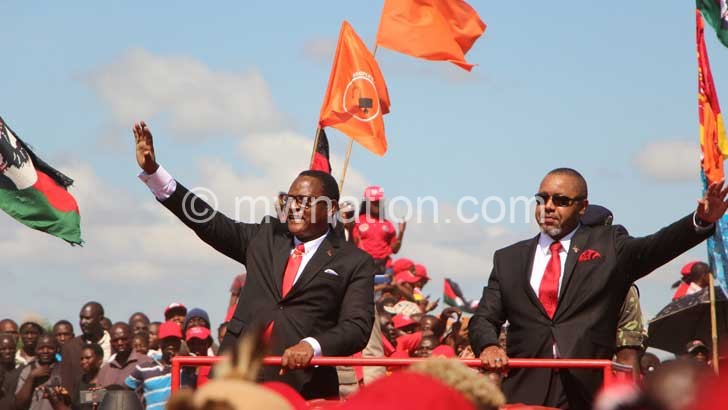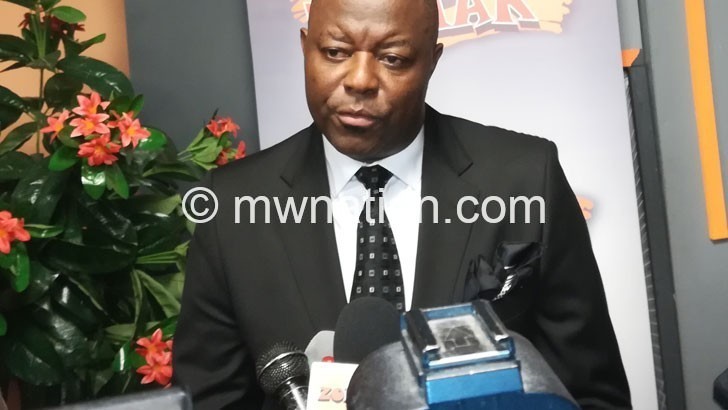Corruption still rampant—report
Findings by Transparency International (TI) in its Corruption Perception Index (CPI) show that corruption continues to worsen in as Malawi as it ranked 129 out of 180 countries after scoring just 30 points.
The score reflects a continued downward spiral as the country scored 32 points in 2018 and was on position 120 before moving backward to 31 points in 2019 with a ranking of 123rd.

But Minister of Information Gospel Kazako, the official government spokesperson, said on Thursday the assessment was largely based on the performance of the previous administration of president Peter Mutharika. He said Malawians should wait for the 2021 assessment of the Tonse Alliance administration led by President Lazarus Chakwera.
The TI report, while stating that the Tonse Alliancegovernment has a chance to root out corruption, cites the ongoing cases on the cement saga and extradition of leader of Enlightened Christian Gathering (ECG) Shepherd Bushiri as a litmus test on its resolve to deal with the vice.
Reads the report: “A recent government audit revealed public sector corruption of astronomical proportions, with an estimated $1 billion allegedly stolen by the previous government. A new government election in June 2020 promises a fresh start, with several investigations into corruption already underway, and some key arrests made in connection witha cement import scandal.
“In addition, the extradition of a high-profile Malawian pastor accused of money laundering in South Africa may be another test of the country’s commitment to anti-corruption.

“Malawi has an opportunity to strengthen good governance and promote anti-corruption efforts to reverse the effects of the Covid 19 pandemic on the economy.”
The 2020 CPI released on Thursday also shows that since 2012, at least 22 countries decreased their scores, including Lebanon, Malawi and Bosnia and Herzegovina while 26 countries improved their CPI scores.
Reads the report: “With a score of 30, Malawi is a significant decliner on the CPI, dropping seven points since 2012. Notorious for the Cashgate scandal of 2013, involving high levels of public sector corruption and misappropriation of funds, the country continues to grapple with corruption.”
Reacting to the findings, Integrity Platform national coordinator Jeff Kabondo, whose institution is a partner of TI, said government needs to let law enforcement agencies work without interference.
He said the recent launch of the new National Anti-Corruption Strategy and a commitment by the current administration to support implementation of the strategy gives hope that the government is keen to fight the vice.
Said Kabondo: “The promise not to interfere with the law enforcement agencies that help to fight corruption because you may have seen that one of the biggest problem that we do have is in the area of prosecution and making substantial arrests when there is suspicion of corrupt practices.”
Recently, several stakeholders expressed dismay over continued rhetoric in dealing with corruption in the country, stating that dealing with the vice requires not only the independence of the Anti-Corruption Bureau (ACB), but also closing cases and restitution.
While not solely blaming the ACB for not concluding many cases in comparison with arrests made over the years since revelations of Cashgate in 2013, the stakeholders said they are worried with closure of the cases, which they believe is deflating people’s trust in the systems.
Malawi Law Society (MLS) president Burton Mhango said while the ACB seems to be doing its work independently after the election, he cautioned against the appetite to arrest politicians, especially those associated with previous regimes.
University of Malawi’s Chancellor College law professor Garton Kamchedzera agreed with Mhango that there has been too much focus on individuals, with little being done on restitution.
He said: “There is no real change between the two regimes in terms of effectiveness. The only change is that the ACB this time seems to have greater autonomy than before.”
In the 2020/21 National Budget, allocation for the ACB has increased to about K5.2 billion from K3.2 billion last year while that of the Directorate of Public Prosecutions has jumped to K1.8 billion from K1.3 billion allocated last fiscal year.
In the 2020 Mo Ibrahim Index of African Governance (IIAG), on corruption, Malawi scored a meagre 34.3 percent, deteriorating with-6.5 points, owing to lack of serious anti-corruption mechanisms, graft in State and public, and private sector institutions.
The country has of late seen many instances of flouted public procurement procedures, which is also a concern in the IIAG report. As for the Corruption Perception Index, Malawi performed well in 2015 when it occupied position 112, but slipped to 120 in 2016, then 122 in 2017, moved up to 120 in 2018 before plunging to 123 in 2019.
Reacting to the rankings, Kazako said Malawi’s poor score is not attributable to the current government, saying: “Wait for our assessment and see how we will score… Fighting corruption is our priority this is why for the first in the history of this republic, the ACB has been adequately funded to sharpen their capacity.”
Centre for Social Accountability and Transparency executive director Willy Kambwandira said Malawi’s fall on the rankings was expected owing to the country’s commitment to tackle corruption.
In December last year, the European Union (EU) rebuffed the Malawi Government’s plea for resumption of direct budget support, saying it is concerned with corruption and poor public finance management structures.
In the June 23 2020 court-ordered fresh presidential election, Chakwera and his team campaigned on the platform of fighting corruption in the country. Chakwera and his running mate now Vice-President Saulos Chilima received 58 percent approval from voters.





